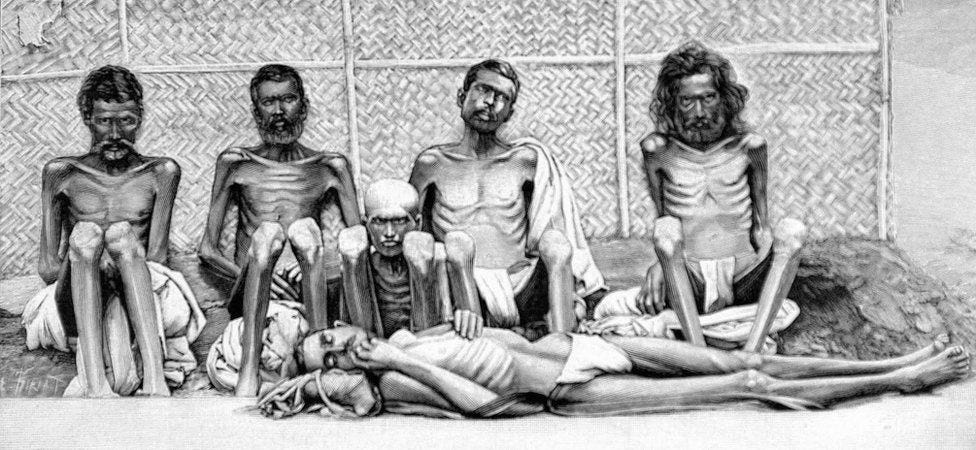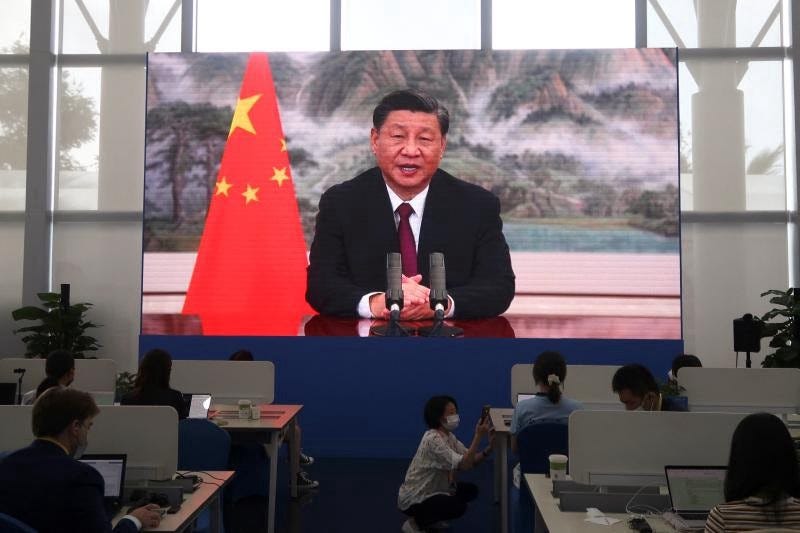I don’t think China wanted to go to war with the US.
I say this based on Xi’s actions during the Bush and Obama Administrations. During this period China became the “workshop” of the world and built an economy on the brink of becoming the largest in the world.
China didn’t need to go to “war” with the US. It was going to become the dominant power in the world by becoming the richest.
Start with population. Does it make sense in any “democratic” way that China, which has over four times the US population, should have less say in global affairs than the US?
China has a bigger working age population twice that of the entire population of the US. There was never any way China would remain a “lesser” power unless it voluntarily accepted that role.
It actually has done so for decades. Being the “Superpower” in a unipolar world comes with benefits, but it has social and economic costs. Big ones. China seems to have envisioned a more gradual transition of power.
Something like the US and Britain. A passing of the torch. A shift in the center of the economic world from NY to Shanghai and a Chinese dominated back half of the century. Without any ugliness or disruptive, expensive warfare.
Then came Trump. Trump destroyed their “trust” in American credibility.
Trump and the Trumpublicans fucked us at the worst possible moment. The Climate Crisis has started and we have no credibility.
Remember this?
Trump Abandons Trans-Pacific Partnership, Obama’s Signature Trade Deal
With the stroke of a pen on his first full weekday in office, Mr. Trump signaled that he plans to follow through on promises to take a more aggressive stance against foreign competitors as part of his “America First” approach. In doing so, he demonstrated that he would not follow old rules, effectively discarding longstanding Republican orthodoxy that expanding global trade was good for the world and America.
How about this?
Trump Serves Notice to Quit Paris Climate Agreement
The Trump administration formally notified the United Nations on Monday that it would withdraw the United States from the Paris Agreement on climate change, leaving global climate diplomats to plot a way forward without the cooperation of the world’s largest economy.
The action, which came on the first day possible under the accord’s complex rules on withdrawal, begins a yearlong countdown to the United States exit and a concerted effort to preserve the Paris Agreement, under which nearly 200 nations have pledged to cut greenhouse emissions and to help poor countries cope with the worst effects of an already warming planet.
How about when Trump’s plan was to “starve” China with tariff’s?
Trump’s China strategy is the most radical in decades — and it’s failing
Trump started a trade war expressly intended to cripple China’s economy.
The goal, according to experts and former Trump administration officials was to squeeze China, in particular its economy. So hard, that they finally understood once and for all, that they had to accept American rules to participate in the global marketplace.
The “thinking” among Trumpublicans was that the Chinese have ripped us off for so long, who cares if they’re unhappy?
“Trump is engaged in a sophisticated form of economic warfare to confront the Chinese, he intends to play hardball”
Steve Bannon, Trump’s former top strategist and a self-proclaimed China hawk.
NOTICE SOMETHING IMPORTANT HERE!
“Trump is engaged in economic warfare with the Chinese”.
ECONOMIC WARFARE IS A FORM OF WAR.
Trump started a war with China via a tweet.
Trump tweeted:
“We can’t continue to allow China to rape our country, and that’s what they’re doing.”
“We are either going to have a real deal with China, or no deal at all.”
Trump threatened to “cut off” China’s food supply by halting grain shipments.
A threat, you heard repeatedly BTW during the Trump years from administration officials. Their attitude towards China was.
“These are our demands. Give us what we want, or we will wreck your economy with tariffs and starve your people by cutting off your food supply”.
Words have consequences. So do actions. J6 trashed American credibility globally.
Thanks to Trump and White America, aka The Trumpublicans, we are seen abroad as unreliable, unstable, and on the verge of a constitutional crisis at a minimum.
So, no one wants to deal seriously with us right now. Do you blame them?
It’s still not clear who who is going to be in power after the elections in 24'.
China has decided that we have become too unreliable a partner to bet their future on in a “Climate Crisis”.

Just because White Trumpublicans don’t care about Climate Change, or don’t believe in it. Doesn’t mean everyone else is as willfully blind and as stupid as them.
A lot of the world is terrified by what’s happening with the Climate. They have been waiting for the US to step up and lead on this issue. Instead we have waffled back and forth.
Wasting everyone’s time.
Not honoring our financial commitments to help developing nations decarbonize their economies.
Not spearheading global efforts to establish a safety net for Climate Refugees.
Not leading an effort to ensure that global food stocks will be shared equitably and the poor will not be viciously exploited or enslaved as a result of hunger.
Other than “The Paris Accords” of 2015 we have done nothing concrete about the “Climate Crisis” everyone has known was coming.
China doesn’t want to be a partner in an American led PAX AMERICANA during the Climate Crisis. Realistically, can you blame them?
They are trying to overturn the existing world order and force a realignment of power resulting in their control of the global market and global security. They want control of the world response to the Climate Crisis and they want the “Who’s in charge?” question answered sooner rather than later.
Again, Can you blame them?
US Generals are saying things like this.
U.S. General’s Prediction of War With China
US general’s ‘gut’ feeling of war with China sparks alarm over predictions
Leaked memo forecasting Taiwan strait conflict in 2025 triggers debate about ‘undisciplined’ comments
When China’s navy is now bigger than the US Navy.
The military labels China as a “pacing threat,” meaning its military is making strategic strides against the US. In fact, China’s navy has surpassed the US Navy in fleet size, and some experts have warned that an American technological advantage may not be enough to maintain superiority, particularly when the US is committing many of its munitions to Ukraine.
End Part Two.
This is my analysis.
This is what I see.
This is my “Crisis Report”.
rc — 02142023
Addendum:
This is a basic outline of the global war that’s raging right now. It’s happening in response to a Climate Crisis that’s quickly getting worse. A Climate Crisis that’s about to get a LOT worse.
In my next few pieces I will continue to discuss the current “Crisis of the Anthroposphere” that is shaking our world to its foundations. If you want to understand the sources that are defining my comprehension of events.
Here are seven books that are “framing” the narrative for me.
A War Like No Other: How the Athenians and Spartans Fought the Peloponnesian War
by Victor Davis Hanson (2005)
Trumpublicans are obsessed with the Peloponnesian War. When it comes to ancient Greece and the U.S.-China relationship, the most prominent comparison is the “Thucydides Trap,” made famous by the political scientist Graham Allison, which uses the relationship between Athens and Sparta to draw an analogy between a rising China and the threat felt by the United States today.
The Fate of Rome: Climate, Disease, and the End of an Empire
by Kyle Harper (2017)
This book has become my template for how states collapse under the stress of a polycrisis.
Consider this, in AD 150 the Roman project was at its peak. The population of the Mediterranean basin and Europe is believed to have been around 75 million people. Five hundred years later by 650 AD that population had declined by 50% and Rome had collapsed.
The old story was that this was the result of social decay, warfare, and governmental collapse. Harper, using new studies and data tells a completely different story. One of changing climate and multiple pandemics.
Starting in 150 AD the weather in the Roman world started getting worse, going from warmer to colder. It got progressively worse for the next 500 years causing multiple droughts, falling agricultural output, and famines.
This climate change was a disaster in and of itself, but it didn’t happen by itself. One of the points that Harper makes is that the Romans created a world where a pandemic could happen.
Cities with dense populations connected by highly trafficked trade links bringing in goods and people from all over the world made the Mediterranean a vast petri dish waiting for something deadly to fall into. In 165 AD something did.
Starting in 165 AD the Antonine plague is estimated to have killed 7,000,000 in the first years that it hit the empire (165–180 AD) killing as many as 40% in many of the major cities.
After 165 AD plague was always happening in the Roman world and some of the “flareups” had fatality rates of 50% in places.
Harper’s point, is that while Rome may have had problems with governance; overshadowing everything was an increasingly hostile climate making it difficult to feed the population and, vicious plagues that depleted the pool of manpower available to do anything. The parallels to the world we are facing today are obvious and compelling.
The Little Ice Age: How Climate Made History 1300–1850
by Brian Fagan (2001)
The part that struck me, was his description of what happened to England in the 1300’s.
At the beginning of the century, after 400 years of good weather (the Medieval “Long Summer”) England’s population reached a peak that Fagan estimates at just over 6 million people. By 1400, after a century of deadly climate change (it got a lot cooler and wetter) the population was around 3 million.
A population decline of 50% in one devastating century.
Late Victorian Holocausts: El Niño Famines and the Making of the Third World
by Mike Davis (2000)
This book explores the impact of colonialism and the introduction of capitalism during the El Niño-Southern Oscillation related famines of 1876–1878, 1896–1897, and 1899–1902, in India, China, Brazil, Ethiopia, Korea, Vietnam, the Philippines and New Caledonia. It focuses on how colonialism and capitalism in British India and elsewhere increased rural poverty and hunger while economic policies exacerbated famine.
The book’s main conclusion is that the deaths of an estimated 60–80 million people (about 6–8% of the world’s population) killed in famines all over the world during the latter part of the 19th century were caused by the laissez-faire and Malthusian economic ideologies of colonial governments.
This is not an easy book to make it through. It’s heartbreaking and horrific in some places. Infuriating in others. Long sections are incredibly dense, dry, and loaded with charts and statistics.
Despite these problems this is a book worth reading. These climate fluctuations, the droughts they caused, and the famines that followed were almost certainly the first signals of global warming due to increasing CO2 levels in the atmosphere.
Collapse: How Societies Choose to Fail or Survive
by Jared Diamond (2005)
This was Diamond’s follow up book to his brilliant “Guns, Germs, and Steel: The Fate of Human Societies”. Expectations were impossibly high for this book and predictably it disappointed most of Diamond’s fans and the reviewers.
That doesn’t mean it is a “bad book”. It’s actually pretty good, but it is uneven. There is one chapter, though, that makes the book as far as I am concerned. The chapter on the collapse of the Norse colony in Greenland.
The fate of that “lost Norse colony” has fascinated people for over a century. By the year 2000 enough archeology and analysis had been done to allow Diamond to compellingly tell the story of what happened to these people.
It’s a story that has relevance because it describes a society's failure to adapt in the face of a changing climate. A failure that resulted in its collapse and extinguishment.
What makes Diamond’s recounting of this story so compelling is that he shows these people didn’t have to die.
The Greenland colony didn’t have to fail. What everyone focuses on is how the changing climate made their way of life progressively more impossible to continue, until everyone starved to death and died. Diamond points out that they were not the only people in Greenland at the time and, that the “other people”, the Inuit, did just fine in the cooling climate.
What killed the Norse wasn’t the changing climate, it was their unwillingness to change and adapt to it.
They were willing to literally die, before they would give up their European way of life and adopt the lifestyle of the indigenous people who they seem to have despised. It’s a cautionary tale that has implications for the world today. As the majority of Americans seem unwilling to entertain even modest changes in their lifestyle in order to slow the progression of the climate disaster about to engulf the world.
Rise and Fall of the Great Powers
by Paul Kennedy (1988)
Personally I find this to be the “best” book on this topic.
Kennedy states his theory in the second paragraph of the introduction as follows:
The “military conflict” referred to in the book’s subtitle is therefore always examined in the context of “economic change”.
The triumph of any one Great Power in this period, or the collapse of another, has usually been the consequence of lengthy fighting by its armed forces; but it has also been the consequences of the more or less efficient utilization of the state’s productive economic resources in wartime, and, further in the background, of the way in which that state’s economy had been rising or falling, relative to the other leading nations, in the decades preceding the actual conflict.
For that reason, how a Great Power’s position steadily alters in peacetime, is as important to this study as how it fights in wartime.
The relative strengths of the leading nations in world affairs never remain constant, principally because of the uneven rate of growth among different societies and of the technological and organizational breakthroughs which bring a greater advantage to one society than to another.
Under a White Sky
by Elizabeth Kolbert (2021)
The final section of the book dives into humanity’s alteration of the atmosphere through the burning of fossil fuels, and the various technologies and techniques that could reverse its ill effects. Among those are Carbon Capture and Solar Geoengineering.
Carbon capture draws carbon dioxide out of the atmosphere and stores it underground, in trees, or in vegetation at bottom of the ocean. The International Panel on Climate Change models show that keeping global temperature rise below 1.5 degrees Celsius involves carbon capture.
Though carbon capture is not complicated and already commonplace on submarines, where carbon dioxide is removed from the air to keep crews safe, the challenge is scale and cost. No current technology comes close to removing the forty billion tons of carbon dioxide currently being released into the atmosphere every year.
Solar geoengineering proposes to seed the stratosphere with particles of diamonds or calcium carbonate to prevent the sun’s rays from reaching the earth. This would increase the Earth’s “albedo”.
Increasing the Earth’s Albedo artificially will slow the increase in temperature. If deployed at large enough scale to “turn the sky white” it will even allow us to cool the Earth by several degrees.
However, once this technology is deployed, it cannot be halted so long as humanity continues to release carbon dioxide. Negative emissions technologies face a similar problem: Offsetting some of the effects of climate change saps some of the urgency from transitioning off fossil fuels.
Ultimately, humanity may not have a choice, as these technologies, fraught with unintended consequences as they may be, could offer the only way to avoid even worse outcomes that are the result of past human decisions.
Human attempts to control nature have brought about a future that’s likely to be different from any period in the planet’s history.
If you want to read more of my climate articles. Sign up to get my newsletter.
I don’t write “every day”, but when I do write, it will be analysis that you won’t find anywhere else that isn’t classified or behind a paywall. Remember:
Multiple degrees (EE/CS - Berkeley, History of Technology - Texas A&M, Anthropology - American University)
Military Service - Ex-Seal and NROTC scholarship
Intelligence Work - Ex-NSA writing threat assessments and briefing papers.
Opinions are like assholes. Everyone has one and generally it’s full of shit. If you want informed analysis you are going to pay for an “expert’s” time. I’m retired, you are getting a bargain.








This is an excellent post! Bravo!
I really liked some of the points you made. Like, why should the US, a country of 300 million people, have more influence in global affairs than a country with 1.3 billion people?
I am subscribing to your newsletter.
Sincerely,
The Penguin